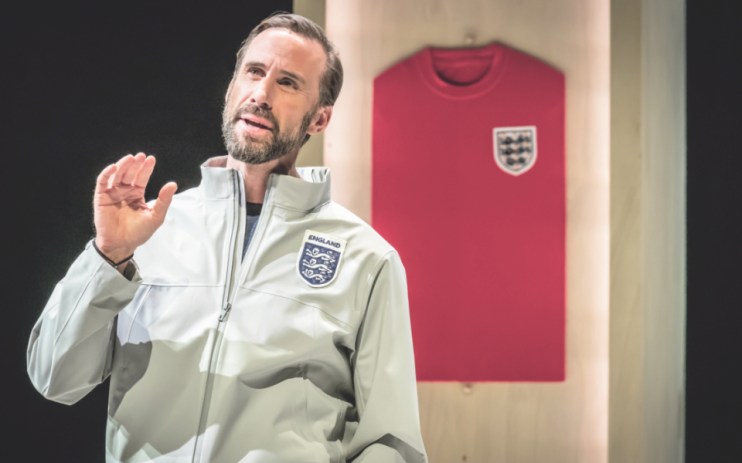Dear England review: Gareth Southgate play hits the back of the net

There is something inherently cruel about making English people sit through a play about their national team taking penalties. Much of our collective psyche seems tied up in our ability to snatch defeat from the jaws of victory, failing in the most heartrending possible way.
This new play written by the prolific James Graham follows Gareth Southgate and his team from the moment the role was thrust upon him up until their glorious defeat by France in the Qatar World Cup quarter final.
Even by the standards of the National Theatre, Dear England has the feel of something big. Luminaries from the worlds of sport, media and entertainment filled the Olivier, some of them represented on stage. I’m sure I saw Ian Wright wipe away a tear watching Harry Kane miss that penalty against France in Qatar, and David Baddiel must have felt a warm tingle hearing the crowd sing Three Lions, even if he is thoroughly sick of the song.
While a guaranteed seat-seller, Dear England is a bold gambit from the NT, retelling a story we’re all painfully aware of and attempting to recreate the sublime highs and lows of football without any professional players… or even an actual football.
But as soon as Joseph Fiennes walks onto the stage you know you’re in safe hands. It’s uncanny how much he resembles Southgate, both in appearance and mannerisms. From the voice to the subtle way he holds himself, he utterly inhabits the role. His Southgate is a likeable, awkward, introspective man, still trapped in that fateful moment in 1996 when he missed the crucial penalty against Germany.
Fiennes is surrounded by a group of young actors who show themselves equally adept at mimicry. Graham and director Rupert Goold expertly walk the ethical tightrope, making fun of the players without ever feeling mean. Adam Hugill nails Harry McGuire’s dopey manner, while Josh Barrow perfectly captures Jordan Pickford’s fidgety energy. Will Close is also excellent as Harry Kane, his impression of a man apparently devoid of personality initially bordering on the cruel but turning full circle as the player’s heart and mettle are shown.
If you were wondering what a political writer is doing making a play about football, well, this isn’t just about football – through the prism of the national team, Graham asks what it is to be English, and asks if this generation of more connected, activistic players might represent the country’s move to a softer, kinder type of place. The football is also peppered with appearances from political figures including Theresa May and Boris Johnson, the lampooning of whom certainly brought a smile to Ed Miliband’s face.
Graham also tugs mercilessly on the heart strings and, honestly, eliciting feelings of sympathy from watching players clutch their heads, bereft, after missing a crucial kick is not the hardest trick in the world. Just listening to the stunned silence, or hearing Gary Lineker’s verbatim commentary, brings all those memories flooding back. It’s not cheap, exactly, but neither is it particularly expensive.
There’s also a slight structural issue. From the outset Southgate impresses upon his players the importance of a three-act structure – Russia 2018, England 2020/1 and Qatar 2022– but Graham’s final act fizzles out somewhat, the Qatar World Cup not quite reaching the highs of losing on penalties to Italy in the final of Euro 2020 and the subsequent victory of the women’s national team.
But boy does it all hit you right in the feels. It’s a magnificent achievement, from the balletic choreography of the players to the staging that recalls the vastness of a football stadium to the excellent use of canned sound and projections.
Graham isn’t able to give us an England victory at the end but he delivers virtually everything else you could hope for.
